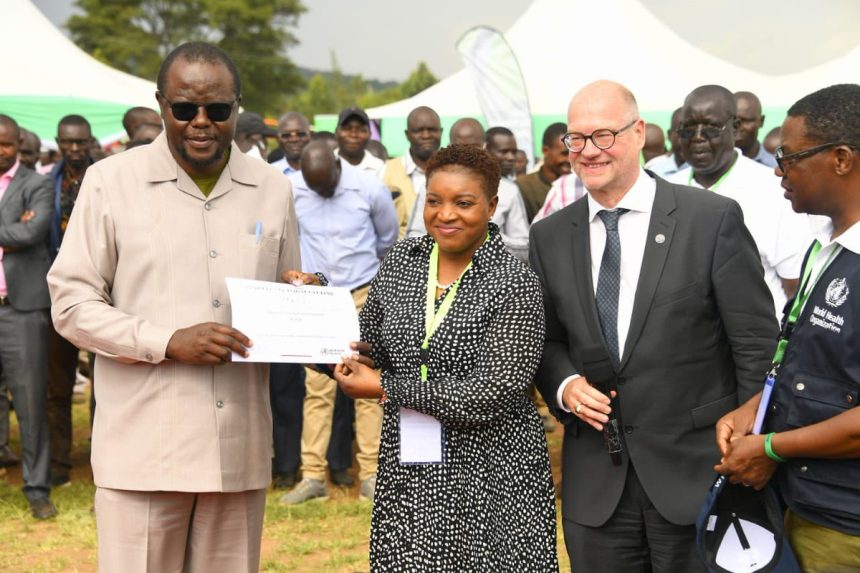The government will support efforts to help farmers transition from tobacco farming to healthier alternatives across the country in efforts to reduce the health dangers associated with the cultivation and use of tobacco products in Kenya.
Speaking at the celebration of the World No Tobacco Day in Sibuoche, Migori County, on Wednesday, Health Cabinet Secretary Susan Nakhumicha said projects to help smallholder farmers ditch tobacco will boost their health while also building the country’s food security.
“Investing in food production [instead of tobacco farming] can promote sustainable agricultural practices, preserve our ecosystem, and ensure food security and good nutrition for our growing population,” Ms Nakhumicha said.
More than 2,000 farmers in Migori County have already transitioned from tobacco farming to growing of high-iron beans, supported by the ‘Tobacco-Free Farms’ project initiated by the World Health Organisation last year.
So far, the farmers have harvested 196 metric tonnes of the beans – which the locals call nyota (star) – and has been sold through Farms-To-Market Alliance (a partnership with WFP), earning the farmers cumulatively about Sh13.4 million. The project has since expanded to Bungoma, Busia, and Meru, other leading tobacco-growing counties.
To support the transition, Ms Nakhumicha said the government will endeavor to revive the South Nyanza (Sony) sugar company and other struggling sugar plants in the country, including Mumias, Nzoia, and Muhoroni, to give farmers an alternative crop instead of tobacco.

Migori Governor Ochillo Ayacko said the farmers are willing to transition and ditch tobacco farming, but they don’t have any viable alternatives and it’s the main cash crop on which many residents in the county depend.
“Our people are ready to transition, but the challenge is that the closest alternative we have, which is sugarcane growing, is also fading,” he said, asking the government to expediate the revival of Sony Sugar factory in Awendo subcounty.
Mark Nyamita, Member of National Assembly for Uriri, the county’s largest tobacco producing subcounty, said besides sugarcane, the State and development partners can support the transition into other alternatives by providing the farmers with free seeds and fertilisers.
“Most of our people rely on tobacco farming; it is a commercial crop that our people hold so dear, but as we transition, can we also find a way to support these farmers so their children can continue to go to school?” Mr Nyamita said at the celebration on Wednesday.
Migori is home to more than a third of the 50,000 tobacco growers in Kenya, and about 70 percent of the tobacco processed in Kenya every year comes from the county. Tobacco is the leading cash crop in Migori.
However, the health hazards associated with the crop pushed WHO to partner with the national government, Migori county government, World Food Programme and the Food and Agriculture Organisation to help farmers shift to healthier alternatives.
The ‘Tobacco-Free Farms” project was piloted in Kenya, as part of a global initiative to reduce supply of tobacco in efforts to discourage smoking. If successful, it will be replicated in other countries on the continent and around the globe.
“Kenya in general, and Migori County in particular, are showing to the world that a change is possible, and that it is improving the livelihoods of farmers, giving them a better income, with less labour,” said Adriana Blanco, the head of the WHO Framework Convention on Tobacco Control (FCTC) Secretariat.
The Kenya Tobacco Control Act of 2007 and the FCTC, which Kenya ratified in 2004, require the government to provide alternatives to tobacco production as a way of preventing possible socio-economic effects on people whose livelihoods depend on tobacco production.
Besides discouraging supply by helping farmers shift to other crops, FCTC commits governments to work towards reducing tobacco demand through excise duty on cigarettes and other tobacco products.
In October 2020, Kenya increased excise duty charged on tobacco products by 4.9 percent, which saw tax on manufactured tobacco rise from Ksh8,837 ($77.04) per kilogram to Ksh9,273.55.



